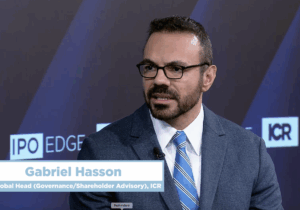Paul Gryglewicz, Senior Partner at Global Governance Advisors
Fast-growing companies can be surprised when their shareholder base switches from insiders and a few loyal investors to a diversified base that thinks about corporate governance much differently. The result is an onus on companies to carefully identify shareholder vote guidelines and identify any misalignments. That’s according to Paul Gryglewicz, a Senior Partner at Global Governance Advisors who spoke to CorpGov in a wide-ranging interview. He pointed out that new areas of expertise have become important for good board directors such as cybersecurity, given the rising value of data protection. The importance of Environmental Social and Governance (ESG) matters, while not immediately obvious to all companies, will increase as more investors factor them into their selection processes. He also points out that controlling shareholder structures at companies like Lyft, Inc., Facebook Inc., and Peloton Interactive, Inc. are more difficult to maintain in public markets given scrutiny from institutional investors. The full interview is below:
Paul Gryglewicz is is a Senior Partner in the Toronto office at Global Governance Advisors. He engages with Boards and senior management advising them in the areas of Executive Compensation, Human Resource Strategy and Corporate Governance. Paul’s work incorporates leading edge governance practices, mitigates risk and educates key stakeholders on sophisticated compensation systems.
CorpGov: What is the key to good corporate governance at a rising technology company and what steps do you take to achieve it?
Mr. Gryglewicz: High-growth companies need to preserve the entrepreneurial spirit. This is a challenge. What catches high growth companies off guard on corporate governance matters is that one year the shareholder base is highly controlled by insiders such as the board and retail shareholders with one or two large investors that have a strong relationship with management. However, the next year, the company can end up blindsided with a more diversified institutional shareholder base that is bound by ISS or Glass Lewis voting guidelines. This is often due to their shares graduating up to a more prominent exchange or by their inclusion in broader market indices such as an S&P 500 or Russell 1000 where more institutional investors hold a position in every stock. Those larger institutional shareholders are not accepting of “yesterday’s” corporate governance practices that allowed the company to achieve the high growth and desire a more typical market governance structure. This forces management and the board to be in reactionary catch up mode as opposed to proactively planning for these changes.
What is key for the board in a rising technology company is to continually monitor shareholder vote guidelines and know where you are misaligned. Once you know where the gaps are you then need to discuss with management and the board where you want to close any identified gaps and at what point in your company’s growth cycle. Some high-growth tech companies will want to highly align with these guidelines right away while others will have an appetite to swim upstream and be offside until the company matures a little bit more. There are no black and white solutions here, but knowing where the gaps in corporate governance are and having a plan to show progress towards closing the gaps over time is half the battle. It is also important to share your story with the marketplace and in cases where you have identified gaps, be able to explain the changes you have made to close certain gaps and why the timing many not be right to close other gaps at this time. Being open and transparent is much better than appearing to be hiding things or avoiding the conversation
CorpGov: What qualities do you look for in good board directors?
Mr. Gryglewicz: Engagement, dynamism, specialized knowledge in either the industry, M&A, finance, HR, and legal experience, where possible. Increasingly, expertise in IT and cybersecurity is also being sought given the importance of data security in today’s world. Above all else, directors have to demonstrate a competence in asking the hard questions to hold management to account, but they also have to remain open minded and respectful both to management and their peers on the board. A board that doesn’t demonstrate respect and open dialogue between one another lends itself to a higher risk of dysfunction and failure to management and shareholders.
CorpGov: One trend that has been slow to change among board directors is age. Do you think boards need to get younger and why?
Mr. Gryglewicz: Decreasing the age of the board is relative. If a board of directors are showing an average age above 70, then perhaps it is time to reconsider your board nomination process and start adding in some seasoned executives at a lower age to reduce the average. But if the question is, do I think 30-year-olds should be on a public board just to bring down the average age, my answer would be no, unless they are a founder CEO that typically receives a board seat given their role.
What is most important is how active a board member is. Are they staying apprised of key governance trends, trends in IT and cyber security and of course, compensation. Age does not dictate if the director can be competent in those areas and how engaged they will be. For example, when Jeff Bezos or Bill Gates get up in age would someone think they should not participate on some boards? The answer is most likely no as they will most likely be phenomenal directors beyond age 70.
CorpGov: In what other ways should boards be diverse?
Mr. Gryglewicz: Boards need to start diversifying beyond just age. California, for example, has put in a specific requirement that depending on the size of the board, a minimum number of females must be appointed to the Board. While male and female representation is a great start, diversity should go beyond just that. The topic of board and senior management team diversity is a global trend. While historically this has tended to just be classified between males and females, various countries have all begun addressing the definition of diversity towards what is now referred to as designated groups such as women but also aboriginal persons, persons with disabilities, members of visible minorities and any other group a corporation may want to consider.
Canada, as of January 1, 2020, has to disclose the company’s policy on diversity at both the board and senior management level using this broader definition of diversity.
Given these disclosure pressures and the global movement of pushing public companies to address, through policy, an inclusive approach to senior management and board diversity, this leads towards having boards in the future rightfully moving beyond just male and female representation and including more individuals from the broader designated groups.
CorpGov: What other things should companies be responsible for be beyond shareholder profits?
Mr. Gryglewicz: Profits are critical, but so are some of the ancillary items today such as the company’s approach to Corporate Social Responsibility and/or Environmental Social and Governance (ESG) matters. It is important that executives and boards monitor this important area as it will impact the longer-term performance of the company. While it may not be totally obvious why this would help link to a better bottom line in the short run, it does play a critical role in raising capital with institutional investors who are increasingly adding ESG considerations into their investment decisions when deploying capital.
In addition, companies need to be responsible for privacy and data management. In a technology driven world, where even some of the largest organizations in the world are being hacked, management and the board need to have a strong grasp on this in order to plan for and mitigate the risk of a hack. Our emPower platform is a resource we often recommend to our clients.
CorpGov: It’s common for tech companies to have controlling shareholders. Does the failure of some recent unicorn IPOs such as WeWork and Lyft change the game?
Mr. Gryglewicz: To a degree yes it does. IPOs with controlling shareholders are harder and harder to be successful today given the current shareholder advisory firm guidelines, which are quite negative on controlling share structures. While Facebook was an early success under the controlling shareholder model, it has come under heavy scrutiny nowadays in the wake of Cambridge Analytica and the fear of interference in government elections. Some are now questioning whether Mark Zuckerberg should continue to have so much control over the company.
Many reputable institutional shareholders are bound to invest within a certain shareholder advisory firm guideline, such as those published by ISS or Glass Lewis, or may follow their own principles when making decision The view of each shareholder having an equal say (i.e. 1:1) for each share they own is preferred in today’s market to avoid shielding founders and controlling shareholders from criticism under a controlling share structure, which entrenches management and the board in many cases.
Despite having a talented executive entrepreneur in the private sector, once that company agrees to diversify its shareholder base with the public markets, the game changes immediately. Transitioning from a private company to a public company is like an NFL player transitioning from football to hockey, it’s not even played in the same stadium or under the same rules. Before making the leap to a public company, private companies have to do their homework and understand what they are getting themselves into. They need to structure their compensation and governance frameworks in a much different way to deal with the rigors of quarterly reporting, institutional shareholders, and disclosure requirements that are not as onerous at a private company. This requires greater board education up front to avoid any unintended surprises such as the challenges that faced WeWork in preparing for and ultimately withdrawing its IPO.
Contact:
www.CorpGov.com
Twitter: @CorpGovernor






